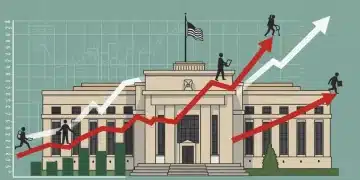Inflation cools, Fed signals future cuts ahead

Anúncios
Inflation cooling signals from the Fed indicate potential changes in consumer behavior and investor strategies, impacting spending power and market dynamics.
Inflation cools, and this shift has the Federal Reserve signaling future cuts. What does this mean for your finances and the economy? Let’s dive into the details and examine the potential ripple effects.
Anúncios
Understanding the recent inflation trends
Understanding the recent inflation trends is vital for making informed financial decisions. Inflation affects everything from groceries to gas prices, impacting how we manage our budgets.
Recently, we have seen a cooling of inflation, which has caught the attention of economists and policymakers alike. This shift means that the rates of price increases have slowed down, leading to potential changes in consumer behavior.
Anúncios
Key Factors Influencing Inflation
Several factors contribute to the fluctuations in inflation rates. By examining these elements, we can gain deeper insights into the economic landscape.
- Supply chain disruptions
- Changes in consumer demand
- Aspects of government monetary policy
- Global economic conditions
As the economy recovers from recent shocks, understanding these factors helps us predict future trends. An essential aspect to watch is how the Federal Reserve responds to these changes.
The Role of the Federal Reserve
The Federal Reserve plays a crucial role in managing inflation through its monetary policies. When inflation rises, the Fed may increase interest rates to cool the economy down. Conversely, if inflation slows too much, they might lower rates or implement other measures to stimulate economic growth.
In the current context, the Fed’s signals about future cuts indicate they are aware of the changes in inflation. This awareness suggests they are ready to act if necessary, which can reassure consumers and businesses alike.
By keeping an eye on these trends and understanding their implications, individuals can better navigate their financial situations and prepare for future fluctuations in prices.
Inflation remains a key topic in current economic discussions. Staying informed allows us to make smarter decisions and helps us adapt to a rapidly changing market.
How the Fed’s signals influence markets

The signals from the Federal Reserve can have a profound impact on financial markets. When the Fed makes announcements about interest rates or monetary policy, traders and investors quickly react, influencing stock prices, bond yields, and overall market sentiment.
It is important to understand how these signals work. A change in the Fed’s stance, whether it is an increase or decrease in interest rates, can send ripples through the economy. Traders monitor Fed meetings closely, waiting for any hints about future policy.
Market Reactions to Fed Announcements
Often, the immediate response in the markets can be dramatic. This can include:
- Stock market volatility increases.
- Bond prices may fluctuate significantly.
- The value of the dollar can shift rapidly.
- Consumer confidence is often affected.
For example, when the Fed signals a potential increase in interest rates, stocks often dip as borrowing costs may rise for companies and consumers alike. This is a critical factor for businesses that rely on loans for expansion.
The Importance of Communication
The Fed’s ability to communicate its intentions clearly is crucial. Using language that markets can interpret helps to stabilize reactions. Sometimes, vague wording can lead to confusion, increasing market volatility.
Understanding the nuances in these communications can aid investors in making informed choices. It’s essential to recognize that while the Fed has significant influence, other factors also shape market behavior.
The interconnectedness of global economies means that external events also play a role in how markets respond to the Fed. Keeping track of international news and economic indicators can provide investors additional context for understanding market movements triggered by the Fed.
Potential implications for consumers and investors
The potential implications of recent changes in inflation and Fed signals are significant for both consumers and investors. As inflation cools, consumers may find their purchasing power increasing, leading to shifts in spending habits.
For investors, the Fed’s decisions can affect market confidence and asset valuations. Understanding these factors can help in making better investment choices.
Impact on Consumers
When inflation rates decrease, consumers may experience:
- Lower prices on goods and services.
- Improved savings rates due to decreased costs.
- Greater confidence in spending, leading to increased consumption.
These changes can create a ripple effect in the economy. Increased consumer spending can boost business revenues, potentially leading to job creation and wage growth.
Investor Reactions
For investors, the response to a cooling inflation environment can be mixed. Some potential outcomes include:
- Stock markets may rally, reflecting higher consumer spending.
- Bond prices could rise as investors seek safer assets.
- Real estate may see increased demand due to lower mortgage rates.
However, the response can vary based on how the Fed communicates its intentions. If investors perceive that the Fed is not acting decisively, uncertainty may increase, leading to market volatility.
By staying informed about inflation trends and the Fed’s signals, both consumers and investors can make more strategic decisions. Adjusting spending habits and investment strategies based on these trends can help in navigating the economic landscape more effectively.
Expert opinions on future economic shifts

Expert opinions on future economic shifts can provide valuable insights into how the landscape might change. Many economists and analysts are closely monitoring inflation trends and the Federal Reserve’s actions to predict what could happen next.
Understanding different viewpoints helps us grasp the complexity of the economy. Some experts believe that we may see a prolonged period of stability, while others warn of potential volatility. Both perspectives are important to consider.
A Diverse Range of Views
Economists often express varying opinions based on their analysis of data and trends. Here are some viewpoints:
- Some predict that continued low inflation will allow consumers to feel more confident in spending.
- Others anticipate that global economic pressures may lead to future price increases.
- Many experts think that the Fed will need to adjust its policies based on economic developments.
Listening to these insights can aid consumers and investors in making informed choices, particularly as markets react to new data.
The Role of Data in Predictions
Data is a crucial element in shaping expert opinions. Recent data on employment, consumer spending, and inflation rates all influence economic forecasts. Analysts pay attention to:
- Job growth rates as indicators of economic health.
- Consumer sentiment surveys that measure confidence.
- Trends in production and manufacturing as signals for future demand.
These factors can help paint a clearer picture of what the economy might look like in the near future. By analyzing changing data, experts adjust their predictions to provide more accurate forecasts.
Listening to expert opinions allows everyone to prepare for how these economic shifts can affect their daily lives, investments, and overall financial planning.
Conclusion:
Understanding the factors that influence inflation and the Federal Reserve’s signals is essential for consumers and investors alike. By keeping an eye on expert opinions and economic data, you can navigate your financial decisions more effectively. As inflation cools and markets react, staying informed will empower you to adapt your strategies for a more stable financial future.
FAQ – Frequently Asked Questions about Inflation and Economic Impacts
How does inflation affect consumer spending?
When inflation cools, consumers may have more purchasing power, which can lead to increased spending and confidence in the economy.
What should investors look for with Fed signals?
Investors should monitor interest rate announcements and economic data, as these can influence market behavior and asset values.
What role do experts play in understanding economic shifts?
Economists analyze data and trends to provide insights and predictions, helping consumers and investors make informed decisions.
Why is it important to track inflation rates?
Monitoring inflation rates helps individuals and businesses adjust their budgets and investment strategies effectively in response to economic changes.





